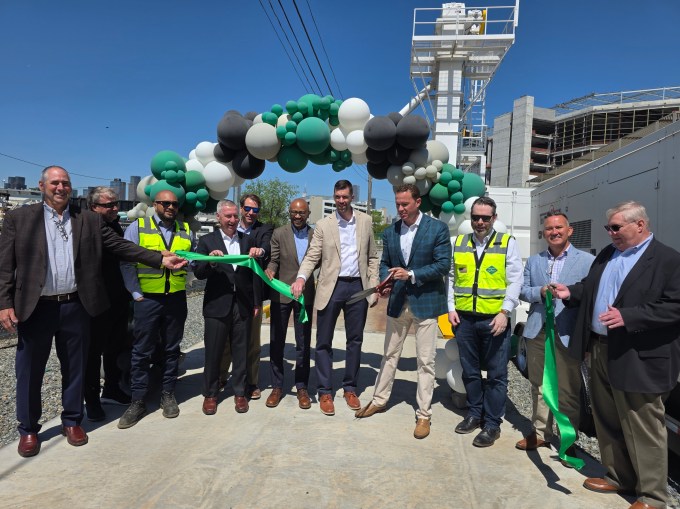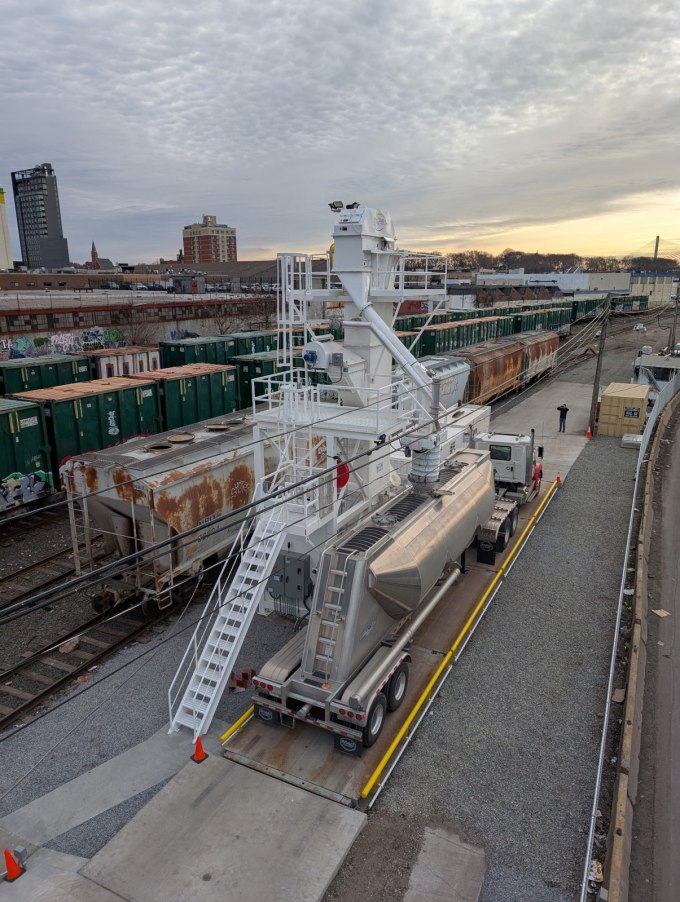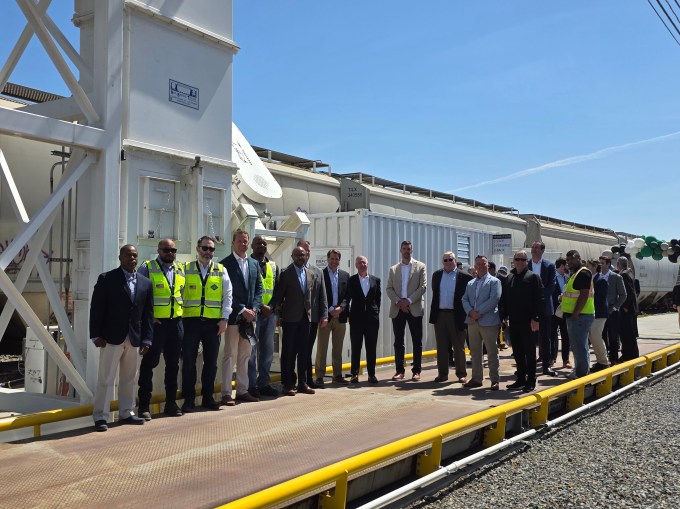
Representatives from Eco Material Technologies, New York & Atlantic Rail and Precision Terminal Logistics cut the ribbon at the new Blissville rail terminal on Tuesday. Photo: Shane O’Brien.
April 30, 2025 By Shane O’Brien
Eco Material Technologies, a company specializing in sustainable and environmentally-friendly cement alternatives, celebrated a ribbon-cutting Tuesday morning for a new rail terminal in Blissville that will deliver non-carbon cement materials to New York City.
Eco Material, in conjunction with New York & Atlantic Railway and Precision Terminal Logistics, worked on the new rail terminal at 30-27 Greenpoint Ave. as part of efforts to bring the company’s sustainable cement mix to New York City.
The Blissville Terminal marks Eco Material’s first major footprint in the city and enables the company to distribute approximately 50,000 tons of harvested fly ash annually from its national network to support local infrastructure projects.
Fly ash, a byproduct of coal combustion, offers a more environmentally friendly alternative to traditional Portland cement. By reducing the need for new cement production—a major source of carbon emissions—fly ash helps lower the environmental impact of concrete. It also enhances durability by minimizing cracking and permeability.
The new facility will rely on rail infrastructure, including that of New York & Atlantic Railway, to bring fly ash and other sustainable cementitious materials into one of the country’s largest construction markets.
Much of the material will come from Eco Material’s landfill harvesting sites, including its facility in Danville, Pennsylvania. Additional fly ash will be sourced from the company’s Georgia facility, which transforms waste from a former coal-fired power plant into high-performance materials for use in cement.
As the largest marketer and distributor of fly ash in the United States, Eco Material can now transport this material directly to New York City via rail. The supply chain moves fly ash from Georgia to New Jersey, where it’s loaded onto specialized rail barges bound for Brooklyn. From there, it’s transferred by rail to the Blissville Terminal and loaded onto trucks for final delivery to concrete sites across the city—where it’s blended with traditional Portland cement to form a greener mix.
According to the company, replacing just 25% of traditional cement with fly ash can result in a significantly more sustainable, nearly carbon-neutral product.
Eco Material CEO Grant Quasha said the new terminal brings triple benefits: reducing “highly polluting” Portland cement, cutting emissions from truck deliveries, and repurposing industrial waste from the Georgia site.
Quasha also emphasized the positive transportation impact of the rail terminal, noting that shifting 50,000 tons of cement materials per year to rail is equivalent to removing 10,000 cars from New York City’s roads.

Photo: Eco Material Technologies.
Quasha added that opening the terminal after two years of development is a relief and said he is excited to ramp up operations in New York City.
“Our business is national. The fact that we didn’t have a facility to distribute in New York always kind of bugged me, and so I’m excited that we’re now back in this market and able to supply our
customers,” Quasha said at Tuesday’s ribbon-cutting.
The facility will use specialized equipment to remove the materials from rail cars onto trucks for distribution across the city, taking roughly 20 minutes to load each truck.

Truck loading facility at the new Blissville rail terminal. Photo: Shane O’Brien.
Each rail car carries the equivalent of four truckloads of material, and the company hopes to process four rail cars every day—the equivalent of 16 truckloads.
Quasha said transporting the material by rail is up to 95% more cost-effective and environmentally friendly than transporting it from Georgia via trucks.
“There’s way fewer emissions, it’s much better for the local environment and, frankly, the environment as a whole,” he said.
Precision Terminal Logistics, which helped facilitate the development of the new rail terminal, will handle day-to-day operations at the new facility.
Company president David Kearney said the new terminal would allow environmentally friendly materials to be transported by rail as close to their final destination as possible.
“Although we’re converting it to a truck, it’s a local truck, and that is very efficient from a standpoint of it’s not coming from miles and miles away,” Kearney said, adding that it is “critical” to look for environmentally sustainable alternatives for concrete production in New York City.
Marlon Taylor, president of New York & Atlantic Rail, which oversees the train lines that will transport the material in New York City, said moving materials via freight train is the “better option” from an environmental standpoint.
“We believe going via rail reduces truck traffic across our bridges, reduces congestion and reduces transmission-based emissions. And that is great,” Taylor said.
